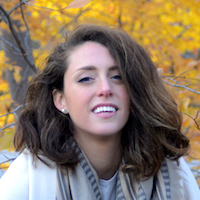![]()
Losing my vision has allowed me to see more clearly and live more presently.
I first told my parents that I couldn’t see in the dark when I was 13.
When my friends and I would chase fireflies, I’d get lost and disoriented. I’d go home confused and upset.
I just couldn’t see.
My family and I started down a determined road of inquiry, and after being shuffled around by doctors, we were finally told that I had something called Retinitis Pigmentosa, or RP. The genetic disease, which is characterized by a gradual dying of the rods in one’s eyes, was the reason for my night blindness. We were told that it causes slow but progressive vision loss from the peripherals inward, and that there is no cure.
It wasn’t long after my diagnosis that I was further diagnosed with anorexia, depression, and anxiety. Our human condition is to have control. But when a fundamental part of our being is out of our hands, we’re faced with the decision to accept it…or disassociate from it and hide. I subconsciously chose to create other problems to be stressed or sad about, like an “imperfect” body or fights with my family, because these were things I had power over at a time when felt I had no control.
In other words, I broke things that I would be able to fix, so that I didn’t have to think about the one I couldn’t—going blind.
At the time, thinking about a life of vision loss was too scary, so I let it fester inside of me for years. I let it bubble up underneath the surface, ready to explode with the smallest of triggers. But living in a constant state of stress was taking its toll on me in a big way.
Even after my frail body had recovered from anorexia, it hurt every day; I had digestive issues that nothing seemed to fix. My sleep was either nonexistent or verging on hibernation. My parents felt like they were walking on eggshells—cautious of the one that might set me off. My stress was contagious and seeping into the lives of those dearest to me.
I wouldn’t say there was a defining moment, but I slowly came to recognize two important things: that I was, in fact, terrified about having RP, and that I’d been using other stories to cover that up for so long.
Once I connected the dots between my desire for control and my condition, I honed in on one thought—that even though I couldn’t control what was happening to me, I could control how I responded to it. I knew I had to find a way to respond better, and that this meant living in the moment, not in the fear of my future.
For as long as I remembered, I’d been bad at being present. And it’s not surprising as to why. Living with RP, there is a constant worry about the unknown: When will I lose my vision entirely? What about the places I need to see before then? Should I have children? Will I be able to see their faces if I do?
So, I slowly started on a journey of self-reflection, accompanied by an in-depth yoga teacher training. During that time, I learned about the impacts of stress on the body and how to reduce it using diet and exercise. I also learned about meditation, and I began to practice mindfulness.
Mindfulness is generally regarded as the act of being in the present moment, without judgment.
At first, it felt like I was doomed to a fate of a wandering mind. But over time, I began to taste my food more. I started really listening and hearing what people were saying in conversations. I took note of the feeling of the sun on my skin or cold air on my nose. It was like I began to see life more clearly—of course, not literally, because if anything, my vision was regressing—but in a way that I could connect with all its treasurable, fleeting moments.
Mindfulness taught me to reflect before I react, thus allowing me to detect when I’m creating a problem to distract myself from what the real one is.
While I’m certainly losing my vision, I now see my world through a different lens than I used to.
What once looked like a dark curse has transformed into something light. Without my visual disability and the journey I embarked on because of it, I might not have found yoga, mindfulness, and all the other hidden gems I have come to discover from choosing to lead a life of acceptance and positivity.
I might not have learned and truly understood what people with incurable conditions experience emotionally, which has become my life’s work. I might not have created a positive support group to serve people with incurable illnesses and disabilities.
I would never have done any of this if I didn’t have RP, and it gives me purpose every day to support others on their journey.
Being an individual with an incurable illness is a fate that I’ve accepted. I know this, because it lead me to my purpose, and that’s something I would never change.
~
Relephant read:
10 Life Lessons Learned From a Chronic Illness.
~
Author: Martel Catalano
Image: Author’s own via Instagram
Editor: Catherine Monkman
Copy Editor: Yoli Ramazzina
Social Editor: Danielle Beutell






Read 1 comment and reply